
Sportlight_7
.pdf
Spotlight 7 ts Mod 07 12-09-08 15:03 Page 101
7 d Culture Corner
Vocabulary
1Focus Building vocabulary related to
football
Refer Ss to the words (1-6) and to the definitions (A-F) and elicit/explain the meanings of any unknown words. Explain the task and allow Ss time to complete it. Check answers around the class.
Answer Key |
|
|
|
|
|
1 |
E |
3 |
D |
5 |
C |
2 |
A |
4 |
B |
6 |
F |
They are all related to football.
Reading & Listening
2 a) Focus Reading for general information
Ask Ss for the names of English football clubs/ players and write them on the board. Explain the task and allow Ss time to read the text quickly. Elicit the names of the clubs and players mentioned in the text (Arsenal, Liverpool, Manchester United - David Beckham, Michael Owen) and compare them to those on the board.
b) Focus Filling in gaps in a text
Read through the Study Skills box and then draw Ss’ attention to the text. Remind Ss to think about the type of words that are missing. Allow Ss time to read through the text again carefully and complete the gaps. Play the recording while Ss listen and check their answers.
Answer Key |
|
|
|
|
1 |
until |
3 |
all |
5 and |
2 |
as |
4 |
has |
|
Speaking
Suggested Answer Key
Football is very popular in England. There are many clubs, and some of the most famous ones are Arsenal, Liverpool and Manchester United. England has some very good players, too. Some of my favourite players are David Beckham, Michael Owen and Steven Gerrard.
b) Focus Talking about your country’s
national sport
Refer Ss to the headings on the board and ask them to make notes about their country’s national sport. Allow Ss time to make notes. Ask individual Ss to talk about their country’s national sport using their notes.
Suggested Answer Key
Football is the national sport of Turkey. There are many clubs, and some of the most famous ones are Fenerbahçe, Galatasaray, Besiktas and Trabzonspor. Turkey has some very good players, too. Some of my favourite players are Emre Belozoglu, Berkant Goktan and Nihat Kahveci. Turkish football fans love going to the matches and many of them collect things like team shirts as a hobby.
Writing
4Focus Writing a short text about a national
sport
Explain the task. Write the heading on the board and ask Ss to use their notes to add to them. Refer Ss to the article in Ex. 2 to use as a model. Allow Ss time to complete the task in class. Go around the class monitoring Ss’ work and helping with any difficulties. Check Ss’ work and give feedback. Alternatively, you can assign the task for HW provided you have gone through it orally in class.
3 a) Focus Talking about football in England
Explain the task and allow Ss time to make brief notes under the appropriate headings. Ask individual Ss to tell the class what they know about football in England using their notes.
101
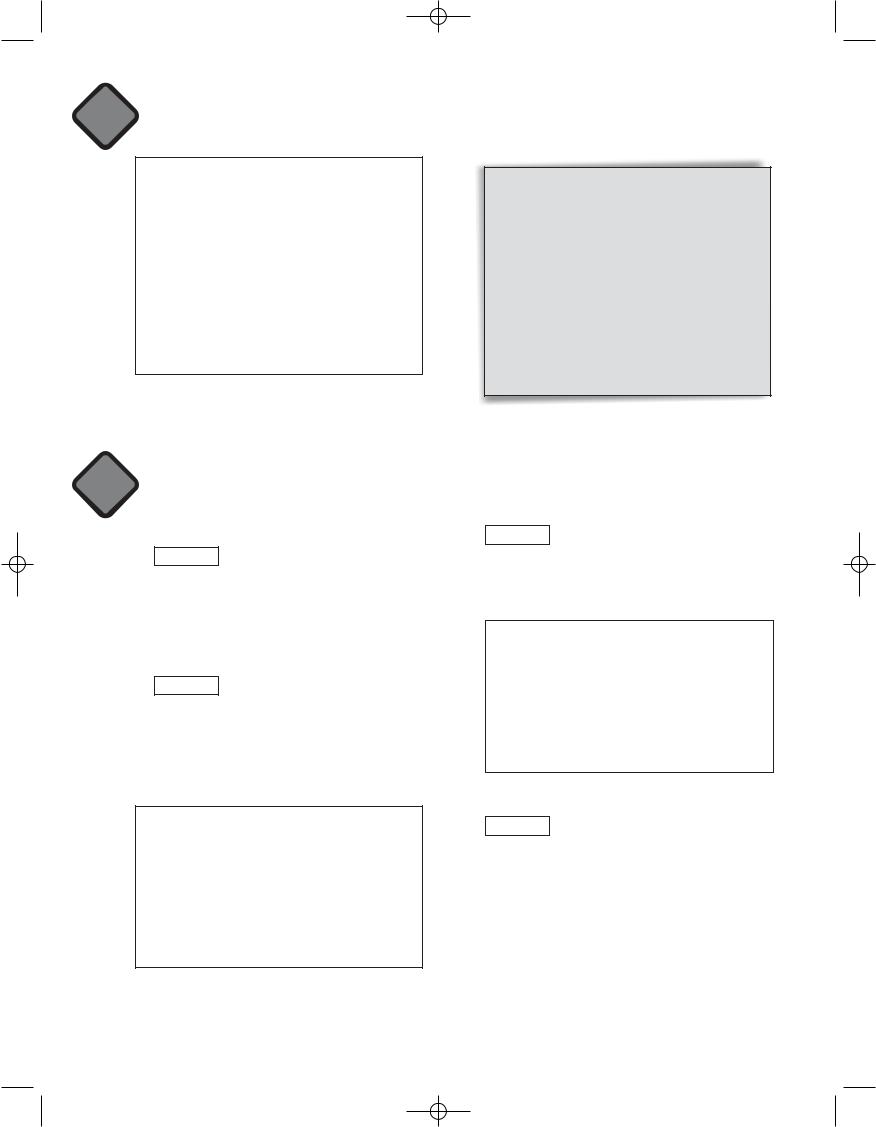
Spotlight 7 ts Mod 07 12-09-08 15:03 Page 102
7d Culture Corner
Suggested Answer Key
Football is an important sport in Russia. There are many clubs, and some of the most famous ones are Alania Vladikavkaz and Zenit St. Petersburg, as well as Spartak Moscow, Lokomotiv Moscow, CSKA Moscow and Dynamo Moscow. Russia also has some very good players, such as Vladimir Beschastmykh, Andrei Karyaka and Aleksandr Kerzhakov. Russian football fans love going to the matches and many of them collect things like team shirts as a hobby.
7 English in Use
& Listening
Focus Introducing expressions
Draw Ss’ attention to the sentences and ask different Ss to read them out loud. Check Ss’ pronunciation and understanding and explain any unknown words. Play the recording with pauses. Ss repeat the sentences.
b) Focus Matching sentences to
appropriate speakers
Read through the rubric and explain the context if necessary. Explain the task. Allow Ss time to guess who says each sentence. Play the recording again as Ss check their answers.
Answer Key
customer: Two tickets for King Kong at 6 pm, please; Two tickets for 9 pm then, please; Is there a discount for students?
ticket seller: Next please; I’m afraid it’s sold out; Is that for the 7 pm or the 10 pm showing?; That’s £12 altogether, then; Here are your tickets and your change; Enjoy the movie!
Synergy
ñAllow Ss one minute to think of six words they have learnt in today’s lesson. Ask Ss to use them to make their own sentences.
ñWhen Ss have finished, ask them to get up and go around the class to find a partner who has something in common with them, e.g. same hair/eye colour, same clothes, same taste in music, etc.
ñAsk Ss to discuss what they have learnt in the lesson with their partner.
2Focus Reading for specific information
Read the rubric and explain the task. Allow Ss time to read through the dialogues. Select individual Ss to answer the questions.
Answer Key
The customer in the first dialogue wants to see Harry Potter and the customer in the second dialogue wants to see King Kong.
The customer in the first dialogue buys tickets for the 7 pm showing and the customer in the second dialogue buys tickets for the 9 pm showing.
Speaking
3Focus Role playing a dialogue
ñSs work in pairs. Read the rubric and explain the task. Tell Ss to use the dialogues in Ex. 2 as an example. Go through a skeleton dialogue with Ss on the board. Ss perform the task. Go around the classroom monitoring Ss’ work and helping with any difficulties.
102
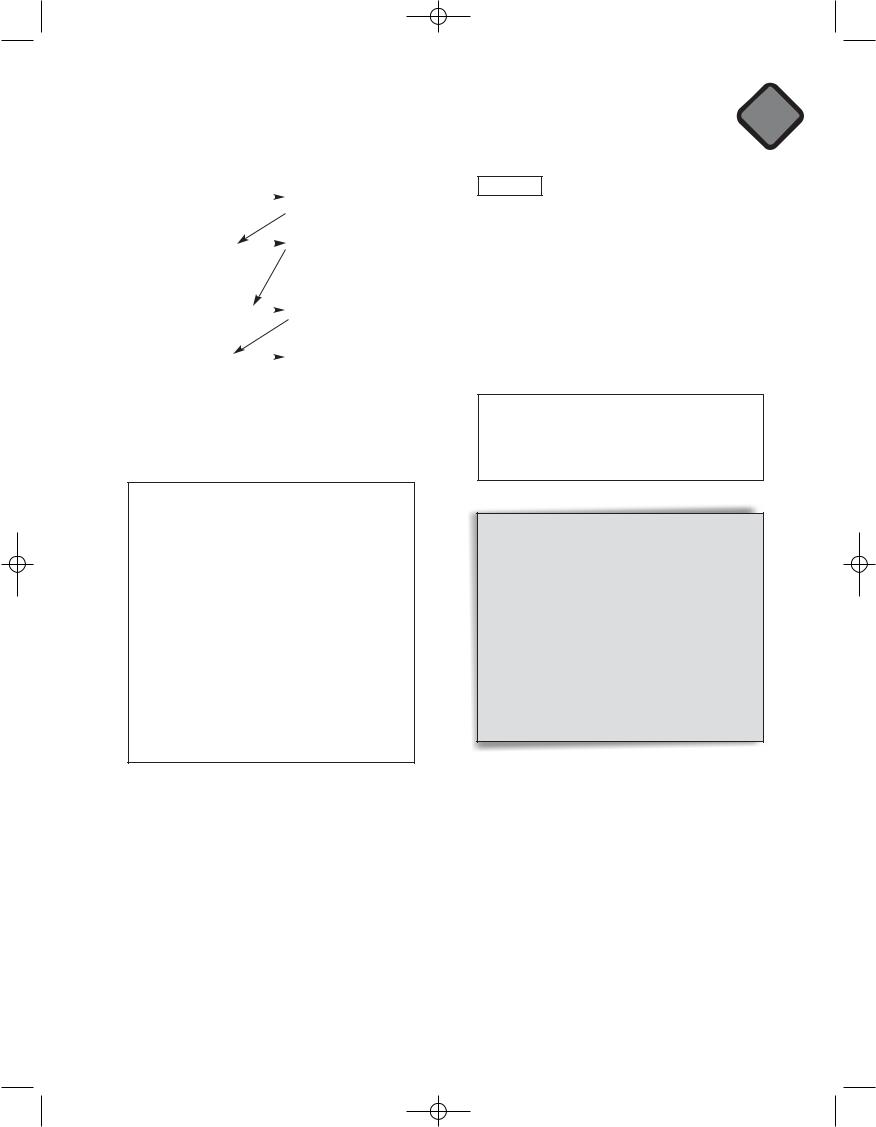
Spotlight 7 ts Mod 07 12-09-08 15:03 Page 103
Student A |
|
|
Student B |
|||
Ask for the next |
|
|
|
|
|
Ask for tickets for a |
|
|
|
|
|
||
customer. |
|
|
specific film. |
|||
Ask the customer |
|
|
|
|
Respond. |
|
|
|
|
|
|||
which showing they |
|
|
|
|||
would prefer. |
|
|
|
|||
Inform the customer |
|
|
|
Pay for the tickets. |
||
|
|
|
||||
of the price. |
|
|
|
|||
Thank and give |
|
|
|
Thank. |
||
|
|
|
||||
tickets and change. |
|
|
|
|||
|
|
|
|
|
|
|
ñFinally, ask pairs to act out their dialogue for the class. If possible, record pairs and play back for feedback purposes.
Suggested Answer Key
A:Next please.
B:One adult and two children for The Family Stone at 4 pm, please.
A:I’m afraid it’s sold out.
B:Oh, right.
A:We still have tickets for the 7 pm and 10 pm showing.
B:Oh, OK. One adult and two children for 7 pm then, please.
A:That’s £17 altogether.
B:Here you are.
A:Thank you. Here are your tickets and your change. Enjoy the film!
B:Thank you.
English in Use 7
Pronunciation
4Focus Pronouncing /ª/, /oμ/
Draw Ss’ attention to the phonemes chart appendix. Ask them to find the two Pronounce the sounds slowly and Demonstrate where your tongue, teeth and positioned for the sound. Ss listen and sounds with the class. Read the rubric and the task. Play the recording. Ss listen and correct boxes. Ss compare answers. Allow to find two more words. Check Ss’ correct any mistakes.
Answer Key
|
/ª/ |
/oμ/ |
|
/ª/ |
/oμ/ |
burn |
|
|
fir |
|
|
bone |
|
|
foam |
|
|
|
|
|
|
|
|
Synergy
ñAllow Ss one minute to think about five expressions they have learnt in today’s lesson. Ask Ss to use them in their own sentences.
ñWhen Ss have finished, ask them to get up and go around the class to find a partner who has something in common with them, e.g. same hair/eye colour, same clothes, same taste in music, etc.
ñAsk Ss to discuss what they have learnt in the lesson with their partner.
103

Spotlight 7 ts Mod 07 12-09-08 15:03 Page 104
7 |
|
|
|
Extensive Reading |
|
|
|
|
|
|
|
|||
|
|
|
|
& Listening |
|
|
|
|
|
|
|
|||
|
|
|
|
|
|
|
|
|
|
|
||||
|
|
Answer Key |
|
|
|
|
||||||||
|
|
|
|
|
|
|
|
|
|
|
|
|
||
|
|
|
|
|
Identifying sounds with feelings |
|
|
|
|
|||||
|
|
|
|
Focus |
|
Paragraph 1 ― Before sound |
|
|
||||||
|
|
|
Go through the different types of films with the |
|
Paragraph 2 ― Musical clichés |
|
|
|||||||
|
|
|
|
Paragraph 3 ― Stereotypical music sounds |
|
|||||||||
|
|
|
class. Ask if they can remember any other types |
|
|
|||||||||
|
|
|
|
Paragraph 4 ― Music around the world |
|
|
||||||||
|
|
|
of films. Tell Ss they are going to listen to some |
|
|
|
||||||||
|
|
|
|
Paragraph 5 ― Listen out |
|
|
|
|||||||
|
|
|
short pieces of music. Ask them to think about |
|
|
|
|
|||||||
|
|
|
|
|
|
|
|
|
|
|||||
|
|
|
how the pieces of music make them feel. Play the |
ñ Ask Ss to look back to the text and to explain the |
||||||||||
|
|
|
recording. Ask several Ss to describe their feelings |
|||||||||||
|
|
|
|
meanings of the words in bold without the use of a |
||||||||||
|
|
|
and impressions. Elicit answers and help Ss with |
|
||||||||||
|
|
|
|
dictionary, |
i.e. they |
can use |
synonyms, |
|||||||
|
|
|
vocabulary and expressions. Ask Ss the question in |
|
||||||||||
|
|
|
|
paraphrase, etc. Elicit/Explain the meanings and |
||||||||||
|
|
|
the rubric and initiate a class discussion. |
|
||||||||||
|
|
|
|
write them on the board. Ss should copy the words |
||||||||||
|
|
|
|
|
|
|
|
|
||||||
|
|
|
|
|
|
|
|
|
into the vocabulary section of their notebooks. |
|||||
|
|
|
Suggested Answer Key |
|
|
|||||||||
|
|
|
|
|
|
|
|
|
|
|
||||
|
|
|
Piece 1 : relaxed, serene - romance |
|
|
|
|
|
|
|
|
|||
|
|
Answer Key |
|
|
|
|
||||||||
|
|
|
Piece 2: tense, anxious - adventure |
|
|
|
|
|
|
|||||
|
|
|
|
|
accompanied (v): went together with sth |
|
||||||||
|
|
|
Piece 3: happy - comedy |
|
|
|
||||||||
|
|
|
|
|
create (v): make/generate |
|
|
|
||||||
|
|
|
Piece 4: tense, anxious - thriller |
|
|
|
|
|
||||||
|
|
|
|
|
moods (n): an emotion at a particular time |
|
||||||||
|
|
|
|
|
|
|
|
|
|
|||||
|
|
|
|
|
|
|
|
|
|
|||||
|
|
|
|
|
|
|
|
|
sharp (adj): strong, clear and easy to hear |
|
||||
|
b) |
Focus |
Matching sounds with films |
|
background (n): sth that is present but not |
|
||||||||
|
|
|
Focus Ss’ attention on the pictures from the film |
|
immediately noticeable |
|
|
|
||||||
|
|
|
|
spot (v): see/notice |
|
|
|
|||||||
|
|
|
scenes. Ask them what type of films they are. |
|
|
|
|
|||||||
|
|
|
|
|
|
|
|
|
|
|||||
|
|
|
Play the recording again. Allow Ss time to match |
|
|
|
|
|
|
|
||||
|
|
|
the extracts to the scenes and check answers |
4 |
|
Summarising the text |
|
|
||||||
|
Focus |
|
|
|||||||||||
|
|
|
around the class. |
|
|
|
|
|
|
|
||||
|
|
|
|
|
|
|
|
|||||||
|
|
|
|
|
|
|
|
|
Suggested Answer Key |
|
|
|
||
|
|
|
Suggested Answer Key |
|
|
Before sound: the role music plays in silent |
|
|||||||
|
|
|
A – 2 (thriller, loud sounds) |
|
|
movies |
|
|
|
|
||||
|
|
|
B – 1 (romance, violin tunes) |
|
|
Musical clichés: music puts you in the right |
|
|||||||
|
|
|
C – 3 (comedy, upbeat music) |
|
|
mood |
|
|
|
|
||||
|
|
|
D - 4 (adventure, electronic tunes) |
|
|
stereotypical |
music |
sounds: |
certain |
|
||||
|
|
|
|
|
|
|
|
|
sounds/types of music prepare us for certain |
|
||||
|
|
|
|
|
|
|
|
|
|
|||||
|
|
|
|
|
|
|
|
|
scenes |
|
|
|
|
|
2 |
|
Focus |
Predicting the context of a text |
|
|
|
|
|
||||||
|
|
Music around the world: instruments used |
|
|||||||||||
|
|
|
|
|
|
|
|
|
|
|||||
|
Draw Ss’ attention to the title and the headings and |
|
indicate country in scenes |
|
|
|
||||||||
|
elicit/explain the meanings of any unknown words. |
|
Listen out: spot musical clichés |
|
|
|||||||||
|
Elicit answers from around the class (the text is |
|
|
|
|
|
|
|
||||||
|
|
|
|
|
|
|
|
|||||||
|
about music in films). |
|
|
|
|
|
|
|
||||||
|
(Ss’ own answers) |
|
|
|
|
|
|
|
||||||
3Focus Matching headings to paragraphs
ñAsk Ss to look back at the text to find the topic of each paragraph. Ask individual Ss to summarise the topic of each paragraph in their own words. Then allow Ss time to match the headings to the paragraphs. Play the recording as Ss check their answers. Check answers around the class.
104
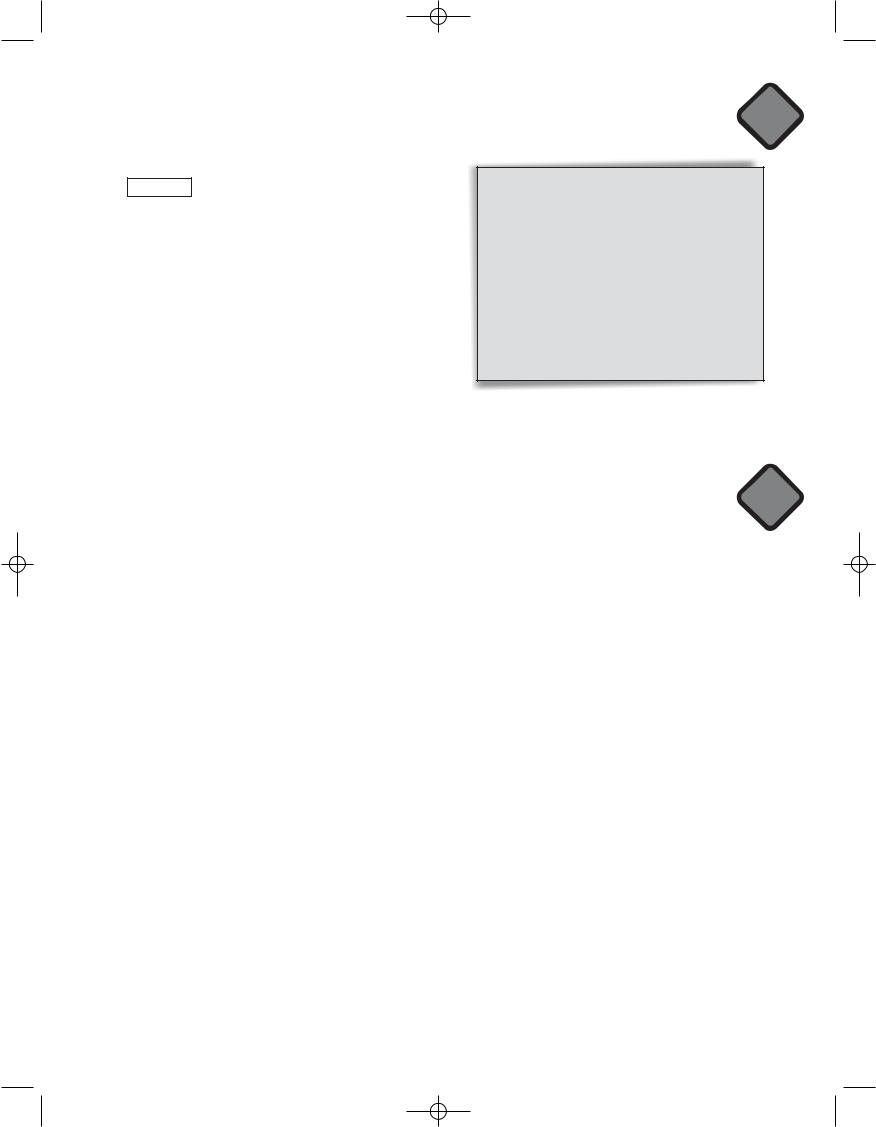
Spotlight 7 ts Mod 07 12-09-08 15:03 Page 105
Project
5Focus Working
Explain the task. Ask individual Ss to the ways music text and ask them their music. Allow class. Go around helping with any give feedback. task for HW orally in class.
(Ss’ own answers)
Extensive Reading |
7 |
Synergy
ñAllow Ss one minute to think about words they have learnt in today’s Ask Ss to use them in their own
ñWhen Ss have finished, ask them to get and go around the class to find a who has something in common with e.g. same hair/eye colour, same same taste in music, etc.
ñAsk Ss to discuss what they have the lesson with their partner.
Progress Check 7
Progress Check 7 and Look at Module 8 should be done in one lesson.
Answer Key |
|
|
|
|
||
1 |
1 |
science |
4 |
thriller |
|
|
|
2 |
romance |
5 |
Adventure |
|
|
|
3 |
animated |
|
|
|
|
|
Hidden word: comedy |
|
|
|||
2 |
1 |
C |
2 E |
3 A |
4 B |
5 D |
3 |
1 |
famous |
4 |
talented |
|
|
|
2 |
funny |
|
5 |
great |
|
|
3 |
intelligent |
|
|
|
|
4 |
1 |
sunnier than |
4 |
better than |
|
|
|
2 |
the worst |
5 |
more carefully than |
||
|
3 |
faster than |
|
|
|
|
5 |
1 |
has lived |
4 |
has always loved |
||
|
2 |
went |
|
5 |
directed |
|
|
3 |
Have you read |
|
|
|
|
6 1 |
yet |
3 |
for |
5 since |
2 |
always |
4 |
ago |
|
71 Lord of the Rings is the best adventure film ever!
2I couldn’t agree more. And the special effects are amazing.
3 Yes, they are. I think special effects are important in adventure films, don’t you?
4 Not always. I think a good story is more important than anything else.
5You’re right. There’s nothing worse than a boring film.
105

Spotlight 7 ts Mod 08 12-09-08 15:02 Page 106
Module 8
Before you start …
Ask Ss to take a quick look at Module 7. Ask Ss if they have ever met a celebrity and, if they have, where and when they met them. Ask them about their favourite films. Ask questions and stimulate a short discussion on the topics. Adapt questions according to Ss' answers.
Look at Module 8
ñAsk Ss to look at the title of the module, Green issues, and elicit/explain the meaning (subjects related to the environment). Refer Ss to the titles of the units on pp. 76-80 and to the various pictures and ask them how they are related to the title of the module, Green issues, (p. 76 Help our planet; p. 78 people who help the environment; p. 80 animals born in their natural habitat).
ñUse pictures 1-3 to stimulate a discussion and to prompt interest in the unit as a warm-up activity. Ask questions to begin a discussion about topics that will be covered in the module, adjusting your questions according to Ss’ responses. This helps Ss feel they have control over their learning.
Suggested Answer Key
Focus Ss’ attention on pic 1 (p. 83).
T: What page is picture 1 from?
S1: It’s from page 83.
T: What can you see in picture 1?
S2: A drop of water.
T: What else can you see on this page?
S3: A diagram of the food chain.
Pic 2 (p. 78)
What page is picture 2 from? What is it? What else can you see on p. 78? How do you think it is related to the title of the section, the text and the rest of the pictures? What else can you see on p. 78?
Pic 3 (p.76)
What page is picture 3 from? What can you see in the picture? How are the other pictures related? What do you think this unit is about? What else can you see on pp.76-77?
Find the page number(s) for
If necessary, elicit/explain each item. Allow Ss time to find the page numbers for each item and check Ss’ answers. As appropriate, elicit/explain how each item is used and where Ss would usually expect to find them.
Answer Key
a magazine article (p. 77)
What is this magazine article about? In what type of magazine would you find it? What do you know about the topic? How is it related to the picture?
a donation form (p. 82)
What is a donation form? What is this one for? Have you ever filled out a donation form? For what? What else can you see on the page?
a for-and-against essay (p. 80)
What is a ‘for and against’ essay? What is the topic of the essay? What do you think you will write about?
a webpage (p. 81)
What is a webpage? Do you use the Internet? What websites do you visit? What is this webpage about?
Listen, read and talk about …/Learn how to …/ Practise …/Write/Make
As described in the relevant section in Module 1.
106
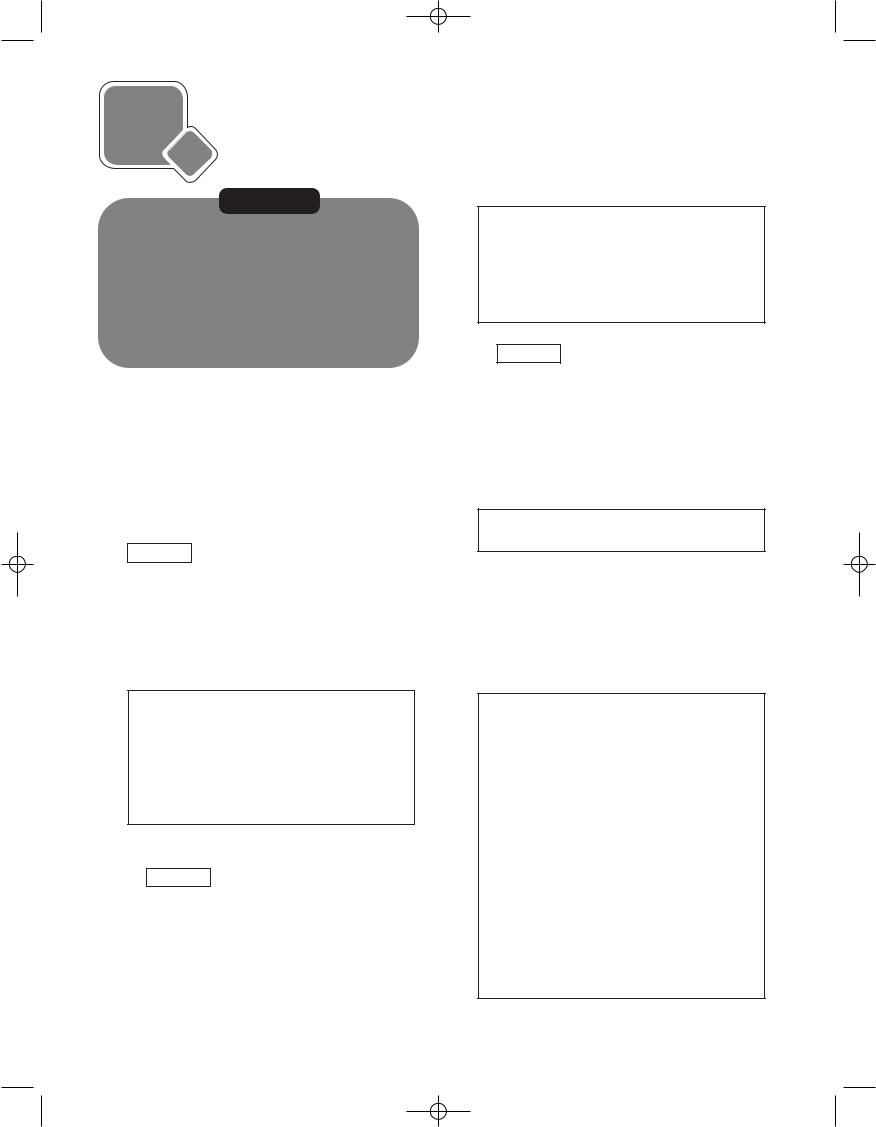
Spotlight 7 ts Mod 08 12-09-08 15:02 Page 107
8 a Save the Earth
Objectives
Vocabulary: related to causes and effects of pollution
Reading & Listening: an article about acid rain Speaking: using notes to give a talk
Grammar: present perfect continuous; have to/don’t have to
Writing: for-and-against essay about keeping wild animals as pets
Introduction
Ask Ss to look at the title, Save the Earth, and the pictures. Elicit/Explain the meaning of the title (help our planet). Ask them what they think the unit will be about. Encourage Ss to predict what vocabulary they will see in the unit.
Vocabulary
1Focus Building up vocabulary related to
causes of pollution
Draw Ss’ attention to the list. Elicit/Explain the meaning of any unknown words. Tell Ss to look at the pictures and decide which show items from the list. Allow Ss time to complete task. Ss compare answers. Check Ss' answers.
Answer Key
Pic 1: a power station/factory, toxic fumes, factory waste
Pic 2: factory waste, polluted clouds
Pic 3: loss of natural habitats, air, water and soil pollution, breathing problems, fish and plant species dying, acid rain
Reading & Listening
2 a) Focus stimulating interest/predicting
content
Ask Ss to read the headings and look at the corresponding pictures. Ask individual Ss to explain the problem. Encourage Ss to use the vocabulary from Ex.1. Write key phrases on the board. Ss read to check their answers.
Suggested Answer Key
Factories and power stations burn coal, cars burn petrol and emit toxic fumes. This causes air pollution and acid rain. Acid rain falls on the earth, seas, rivers, etc, causing water and soil pollution.
b) Focus Reading for specific information;
listening for confirmation
ñRead the rubric aloud. Advise Ss to read the sentences carefully focusing on what precedes and follows each blank space. Allow Ss time to complete the task. Play the recording (twice if necessary) as Ss listen and check. Check Ss’ answers.
Answer Key
1 B |
2 A |
3 C |
4 C |
5 A |
ñAsk Ss to explain the meaning of the words in bold without the use of a dictionary, i.e. they can use synonyms, paraphrase etc. Elicit/Explain the meanings and write them on the board. Ss should copy the words into the vocabulary section of their notebooks.
Answer Key
burn (v): use a product to produce heat, light, etc
emit (v): send out gathered (v): collected oxygen (n): air
atmosphere (n): layer of gas or air around a planet
lands (v): comes to earth sleet (n): icy rain
wipes out (phr v): destroys, kills
poisons (v): kills or makes sick with a toxic substance
reduce (v): lessen harmful (adj): dangerous
solar power (n): energy from the sun heat (v): make hot
107

Spotlight 7 ts Mod 08 12-09-08 15:02 Page 108
8a Save the Earth
Using notes to give a talk
Draw Ss’ attention to the Study Skill box and ask an indivindual S to explain it in their own words. Check understanding. Have a S read out the task and help him/her explain what to do. Ss make notes. Monitor the task and provide help if necessary. Allow Ss time to write and practise their speeches. Provide individual feedback. Ask several Ss to report to the class. Elicit class feedback. Correct where necessary.
Suggested Answer Key
(What acid rain is & what causes it)
Cars, factories and power plants cause air pollution which is gathered in clouds. These clouds carry this pollution, which makes acid rain, long distances. When it rains, snows or when there is fog or sleet, the atmosphere becomes polluted.
(What its effects are)
The rivers, seas, and soil become polluted. As a result, lots of fish and plant species are poisoned or wiped out. People also have breathing problems.
(What governments are doing & what we can do)
Governments are trying to reduce air pollution and are making industries use new technologies. We can use our cars less.
Grammar
4Focus Reviewing present perfect
continuous
ñSs books closed. Write the sentence I have been working here for five years. on the board. Elicit/Explain what tense is being used (present perfect continuous) and how this tense is formed
(have/has + been + ing form of the verb).
ñAsk Ss to open their books. Read the rule. Check understanding. Allow Ss time to read the text again and find examples of the present perfect continuous. Ss compare answers. Check Ss' answers.
Answer Key
In the last paragraph: have been trying, have been using
5Focus Using present perfect continuous
ñHave a S read out the rubric and check Ss’ understanding of the task. Play the recording as Ss listen and match. Check Ss’ answers.
Answer Key
1 E |
2 A |
3 B |
4 C |
5 D |
ñAllow Ss time to complete the sentences. Check Ss’ answers and write them on the board.
Answer Key
1 has been washing the dishes
2 have been playing football
3 has been listening to music
4 has been watching TV
5 has been sleeping
6Focus Practising phrasal verbs (make)
Read the rubric and explain the task. Explain the phrasal verbs. Ss use their dictionaries to look up phrasal verbs and read examples. Allow Ss time to complete the task. Ss compare answers. Check answers and write them on the board.
Answer Key |
|
1 make out 2 made up |
3 made up |
Game
Focus Phrasal verbs (make)
Chain story. Ss play in teams. One S starts the story, then a S from the other team continues it. Teams get one point for each sentence using a phrasal verb with make.
Suggested Answer Key
Team A S1: Sam was angry because John made up a story about him.
Team B S1: John wanted to make up with … etc
Writing
7Focus A short article
Go through the rubric with Ss and elicit key words
(what we can do, solve problem, acid rain). Brainstorm ideas and write them on the board. Allow Ss time to complete the task in class. Check Ss’ work and give feedback. Alternatively, you can
108
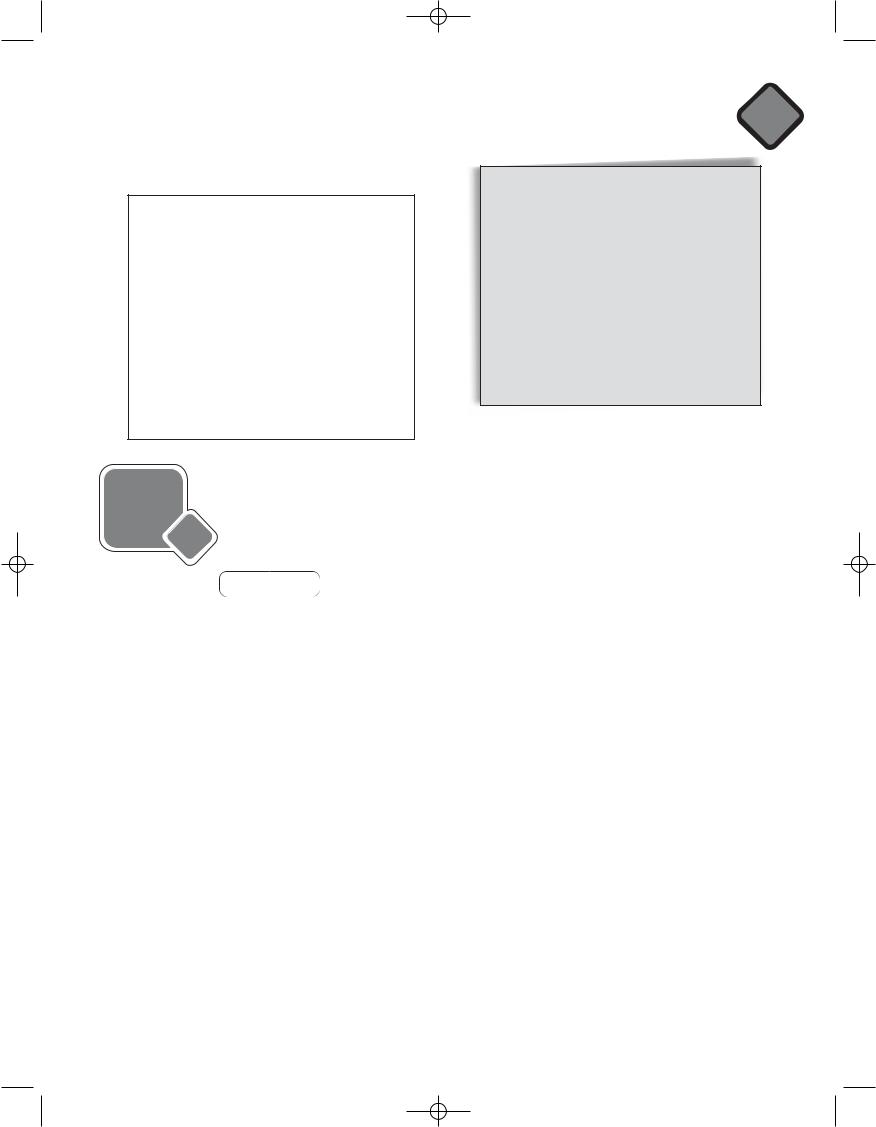
Spotlight 7 ts Mod 08 12-09-08 15:02 Page 109
assign the task for HW through it orally in class.
Suggested Answer Key
If we use wind or solar power, there will be less pollution.
If we turn off lights, TVs and computers when we are not using them, we will save energy.
If we have to drive to work, we should car pool.*
If we write letters to our governments and multinational companies, maybe things will change.
* to share a ride with one or more people to work
Save the Earth 8a
Synergy
ñAllow Ss one minute to think about Study Skill and any ten words they learnt in today’s lesson. Ask Ss to use in their own sentences.
ñWhen Ss have finished ask them to get and go around the class to find a who has something in common with e.g. same hair/eye colour, same same taste in music, etc.
ñAsk Ss to discuss what they have learnt the lesson with their partner.
|
|
8 b |
Eco-helpers |
|
|
|
|
|
|
|
|
|
Objectives |
Ss time to complete the task. Go around the |
|||
|
|
|
|
|
||||
|
Vocabulary: related to eco-friendly activities |
classroom, monitoring Ss' work and helping with |
||||||
|
Reading & Listening: a dialogue about Eco-helpers |
any difficulties. Ask for answers around the class. |
||||||
|
club |
|
Check Ss' answers. |
|||||
|
Speaking/Everyday English: offering/accepting/ |
|
|
|
|
|||
|
refusing help |
|
|
Answer Key |
|
|||
|
Grammar: question tags; (don’t) have to |
|
Sally is collecting rubbish. |
|
||||
|
Writing: a list of activities |
|
|
|||||
|
|
Andy is reading a book about ecology. |
|
|||||
|
|
|
|
|
|
|
||
|
|
|
|
|
|
Jane is teaching the cycle of life. |
|
|
Introduction |
|
|
Tim is building nesting boxes. |
|
||||
Ask |
|
Ss to look at |
the people in the picture and |
|
John is recycling cans. |
|
||
|
|
Rose is cleaning out a pond. |
|
|||||
elicit/explain what they have in common. Ask them if |
|
|
||||||
|
|
|
|
|||||
they have ever done any similar activities and, if so, |
|
|
|
|
||||
when and where. Ask them what they think the unit will |
2 |
|
Building up vocabulary related to |
|||||
Focus |
||||||||
be about. Encourage Ss to predict what vocabulary they |
|
|
|
|
||||
|
tools/equipment |
|||||||
will see in the unit. |
|
Read out the rubric and the list of tools/equipment. |
||||||
|
|
|
|
|
||||
Vocabulary |
|
Explain/Elicit the meaning of any unknown words. |
||||||
|
|
|
|
|
Ask an individual S to read out the example. Allow Ss |
|||
1 |
|
Focus |
Building up vocabulary related to |
|||||
|
time to complete the task. Go around the classroom, |
|||||||
|
|
helping out |
the environment |
monitoring Ss' work and helping with any difficulties. |
||||
|
|
|
|
|
||||
|
Read out the rubric and the list of activities. |
Ask for answers around the class. Check Ss' answers. |
||||||
|
Explain/Elicit the meaning of any unknown words. |
|
|
|
|
|||
|
Ask an individual S to read out the example. Allow |
|
|
|
|
|||
109
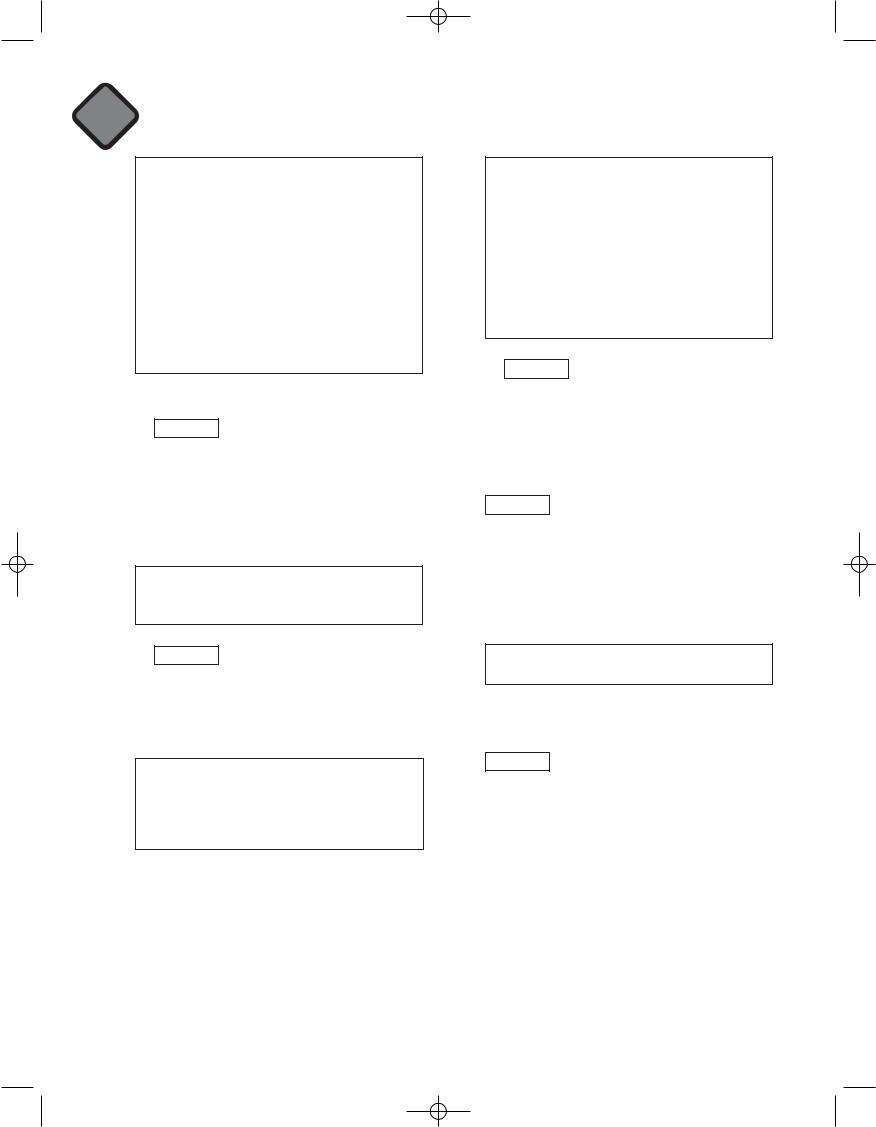
Spotlight 7 ts Mod 08 12-09-08 15:02 Page 110
8b Eco-helpers
Answer Key
Tim is using a hammer and nails to build nesting boxes.
Dave is using a spade to plant flowers. Dave is using a watering can to water the flowers.
Dave is using a rake to rake the garden. Rose is using a net to clean out a pond. Dave is using gardening gloves to work in the garden.
Sally and John are using plastic bags for the rubbish.
Reading & Listening
3 a) Focus Stimulating interest/predicting
content
Draw Ss' attention to the title and the picture and try to guess what 'eco-helpers' means. Play the recording (twice if necessary) as Ss listen and read to see if their guesses were correct. Check Ss' answers.
Answer Key
People that do activities that help the environment, usually voluntarily.
b)Focus Reading for specific information
ñExplain the task. Ask Ss to read the sentences so they will know what information they are looking for. Allow Ss time to complete the task. Ss compare answers. Check Ss' answers.
Answer Key
1 has been collecting rubbish for recycling
2 building nesting boxes
3 we don’t help them
4join
ñAsk Ss to explain the meaning of the words in bold without the use of a dictionary, i.e. they can use synonyms, paraphrase etc. Elicit/Explain the meanings and write them on the board. Ss should copy the words into the vocabulary section of their notebooks.
Answer Key
joined (v): became a member of recycling (n): reusing certain materials left (adj): remaining
nests (n): a bird's home, usually made of grass, branches, etc
leave (v): go away
weather (n): a word to describe whether it is raining, snowing, etc
volunteers (n): people who do sth for free
c) Focus Acting out a dialogue
Draw Ss' attention back to the dialogue and explain the task. Allow Ss time to practise in pairs and then ask individual pairs to act out their dialogue for the class. Accept feedback.
(Answer as dialogue)
4Focus Understanding pairs of confusing words
Draw Ss’ attention to the highlighted words in the rubric. Explain/Elicit the difference in their meanings. Allow Ss time to read the sentences and complete the task. Elicit and check answers. Offer more examples if necessary and refer Ss to their dictionaries for confirmation.
Answer Key |
|
|
1 leaves |
2 lives |
3 leaves |
Speaking
Everyday English
5Focus Offering/accepting/refusing help
ñDraw Ss' attention to the phrases in the box. Read through the phrases with Ss and explain their use. Elicit/Explain which of the phrases is the more formal (Would you like me to …). Check Ss' understanding. Read the rubric and explain the task. Choose a pair of Ss to read out the example exchange.
ñAllow Ss time to make up and practise exchanges, in pairs. Go around the class monitoring Ss' work and helping with any difficulties. Ask several pairs to act out their dialogues for the class. Give feedback.
110
